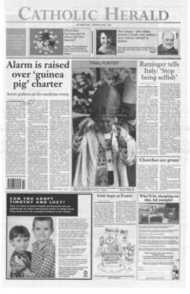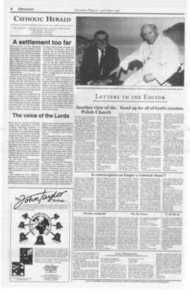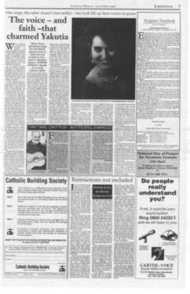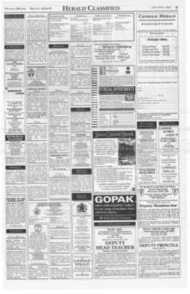Page 3, 4th April 1997
Page 3

Report an error
Noticed an error on this page?If you've noticed an error in this article please click here to report it.
Tags
Share
Related articles
We'll Sit In Lords, Say Bishops
Peering At The Catholic Lords
Catholic Mps Back Women Clergy
,lords' Bishops To Be Axed
Charterhouse Chronicle
Catholic peers fear future under Labour
BY JOE JENKINS THE UNCERTAIN FUTURE Of
the House of Lords is causing growing concern among Catholic hereditary peers, who seem to have most to lose if Labour sweeps to power on 1 May.
Labour launched its assault on "privilege" in December. Of 402 Tory hereditary peers, just three are women, and 228 went to Eton, evidence, claims shadow Home Secreatry, that makes a mockery of John Major's "classless society". Labour has said that if elected it will abolish the right of hereditary peers to sit and vote in the House of Lords.
The implication for the Catholic presence in the upper chamber is clear. There are 46 hereditary Catholic peers and 33 Catholic life peers. Even if some hereditary peers are converted into life peers under Labour, the Catholic voice in the Lords will fast diminish.
This week the Catholic Union called for a constitutional conference followed by a referendum to decide on the future of the Lords. It said: "The changing composition of the Upper House, which is not a determining but purely a revising Chamber, is a constitutional matter which affects far more than the political parties. We are notably under-represented as compared with... the Jewish community."
Philip Daniel, chairman of the Issues Committee of the Catholic Union dismissed the notion that Cardinal Hume might appoint Catholic life peers. "I don't want to see cardinal statesmen. That's not the job of a cleric. Rome says that no bishop should be doing that sort of thing at all." If Labour's proposals come to fruition, he said, "We're going to be the losers. The Anglicans will still have their bishops."
Senior Catholic peers echo his concern, although they accept that some sort of reform is inevitable even desirable.
The Duke of Norfolk, a Tory hereditary peer, denied reports that he supports Labour's plans. "It's not true at all," he said. But would he oppose, outright, constitutional reform? "I'm not saying that either. It all has to be looked into."
Lord Longford, both a life and hereditary peer and a former Leader of the House of Lords, told the Herald that with just 10 Labour hereditary peers, the House is "ludicrously unfair to one party".
He said that the most likely post-election scenario is a compromise. In 1968 the Lords accepted his proposal to allow hereditary peers to speak but not vote. But the proposal was subsequently "sabotaged" in the Commons by the "unlikely alliance" of Michael Foot and Enoch Powell.
A "show-down" between hereditary peers and the incoming Government is, Lord Longford feels, unlikely. "I don't believe that Blair would want that in his first year in office."
It is thought that under Labour a committee would be set up giving Parliament "time to look round" at the options. What seems inevitable is that the Catholic presence will wane. Lord Longford said: "One'll probably have to face that."
Another suggestion, that hereditary peers might elect a number of their own to retain the vote would probably not be welcomed because it perpetuates the status quo.
Hereditary peer Lord Monckton of Brenchley told the Herald: "The most likely outcome is that the vote will be taken away from them."
But, he added: "I believe passionately in hereditary peerages. It's worked very well for hundreds of years. If you attack that, you attack the monarchy. That's what Mr Prescott wants. I don't think that's what Mr Blair wants."
blog comments powered by Disqus











